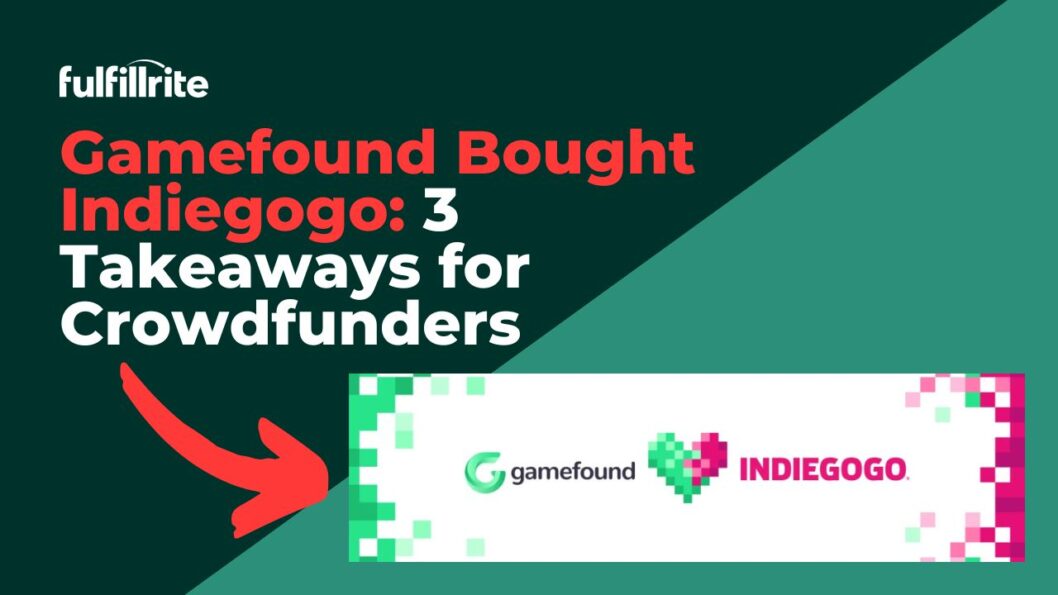On July 24, 2025, Gamefound stunned the crowdfunding world by announcing that it is acquiring Indiegogo. As a direct result, Gamefound’s famously robust back-end software is about to be applied to one of the oldest and largest general‑interest crowdfunding sites.
Make no mistake: Indiegogo has long been a powerhouse in crowdfunding. It’s home to 38 million registered backers and nearly $3 billion in pledges. So hearing that they’ll be making use of Gamefound’s technical expertise going forward is a big deal.
At Fulfillrite, we ship a lot of crowdfunding campaigns from Kickstarter, Indiegogo, Gamefound, and other platforms. We often write about shipping, inventory management, and other supply chain topics.
But all of those come downstream of demand, funds raised, and the amount of items to be manufactured and shipped. And a lot of that comes down to the platform creators choose to launch. For our clients, platform choice shapes everything—from how inventory is allocated to how fulfillment is scheduled.
It’s worth taking a moment to unpack this news and talk about how it will affect crowdfunding creators and the industry at large. So with that in mind, here are three concrete takeaways to help you make sense of the huge announcement.
1. Gamefound & Indiegogo will remain separate brands, but be integrated closely.
First, you should know that neither site is going away. Backers will be able to use their Indiegogo or Gamefound credentials to log into either site. But from the original announcement and press releases, it appears that the discovery algorithms will remain separate.
That is, if you’re looking for an eBike, Indiegogo will probably still be the place to go. And if you’re looking for the latest board game, Gamefound will probably still be the place to go.
2. Gamefound will level up Indiegogo’s technical abiliti es.
Gamefound has been on a relentless sprint to out-feature Kickstarter ever since it started. What it has lacked in sheer community power, it has made up for in features. Being able to transfer their technical expertise to Indiegogo, whose audience is considerably larger, means these features are going to be accessible to a far greater number of campaigners and backers.
That means more creators will be able to deal with complex tier structures, regional tax rules, tariffs, and higher international demand—factors that directly impact how fulfillment must be planned.
Gamefound has many much-loved features to help with VAT calculations and currency exchange. They also have a popular pledge manager often used by board game creators after launching a Kickstarter campaign.
Those capabilities are being ported wholesale to Indiegogo’s tech, film, design, and social‑impact creators, all of which are verticals that previously would not have been eligible for Gamefound.
3. This will increase competitive pressure on Kickstarter.
As of 2025, Kickstarter is known for having the largest crowdfunding community by far. Gamefound, on the other hand, was much more niche, but both backers and creators loved it for its software. Indiegogo was somewhere in the middle, having some additional features not supported by Kickstarter but not quite as many as Gamefound.
This recent announcement changes the terrain by quite a bit, though. With a stronger tech stack behind the scenes, Indiegogo under the management of Gamefound, is going to be a stronger competitor.
Kickstarter will continue to have a much larger community, even after this merger. Nevertheless, this kind of competitive pressure will likely spur Kickstarter to keep rolling out new features, possibly even faster than they have in 2025, which has been historically productive for the company.
For backers and creators, this is good news because the platforms will need to compete on software ability, fee structure, and community size. Kickstarter is likely to continue to grow no matter what thanks to the rising tide of crowdfunding, but the common wisdom of “launch on Kickstarter because it’s Kickstarter” might fade away in the years to come unless Kickstarter keeps up its proactive stance to rolling out much-wanted features.
One thing we’re paying attention to: fraud & scams.
Fraud and scams have been up in recent years. And crowdfunding platforms of all types are no exception to this, and indeed, are more vulnerable to housing scams by merit of their openness to unconventional product launches.
You don’t have to go far to find warnings of scams on Kickstarter, Indiegogo, or other platforms. And, indeed, Indiegogo has faced more public scrutiny in recent years around trust and quality control than its peers.
The reason we bring this up is because Gamefound is successful partly for its tech stack, but also for its good reputation too. So if Gamefound can bring its culture to Indiegogo’s larger audience, that could really change the state of play for crowdfunding at large.
The rise of fraud and scams is both a threat and an opportunity for Gamefound/Indiegogo and Kickstarter. And let’s be clear: trust and safety is going to be a big part of platform success between now and 2030.
Bottom Line
This deal marks a turning point. Gamefound’s technical muscle is about to meet with Indiegogo’s massive reach. Combined, this may well redefine what creators expect from a crowdfunding platform.
For campaigners, that means more tools, more choices, and more responsibility to plan logistics early. For Kickstarter, it means keeping the crown of King of Crowdfunding is going to take consistent commitment to rolling out new features and keeping its backers safe.
The next few years will be defined by one thing: trust. And that will shape not just who wins the platform race, but who delivers on their promises.

